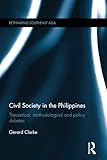Civil society in the Philippines : theoretical, methodological and policy debates / Gerard Clarke.
Material type: TextSeries: Rethinking Southeast Asia ; 11Publication details: New York : Routledge, 2013Description: xxiv, 257 pages : illustrations, maps ; 25 cmISBN: 9780415572729 (hardback); 9780203085127 (ebook)Subject(s): Civil society -- Philippines | Social justice -- Philippines | Power (Social sciences) -- Philippines | Economic development -- Social aspects -- Philippines | Philippines -- Social conditionsLOC classification: HN 713 | C53 2013
TextSeries: Rethinking Southeast Asia ; 11Publication details: New York : Routledge, 2013Description: xxiv, 257 pages : illustrations, maps ; 25 cmISBN: 9780415572729 (hardback); 9780203085127 (ebook)Subject(s): Civil society -- Philippines | Social justice -- Philippines | Power (Social sciences) -- Philippines | Economic development -- Social aspects -- Philippines | Philippines -- Social conditionsLOC classification: HN 713 | C53 2013| Item type | Current library | Collection | Call number | Copy number | Status | Date due | Barcode |
|---|---|---|---|---|---|---|---|
 Books
Books
|
National Museum of the Philippines On Display | Non-fiction | FIL HN 713 C53 2013 (Browse shelf (Opens below)) | c.1 | Available | NMLIB-01716 |
Browsing National Museum of the Philippines shelves, Shelving location: On Display, Collection: Non-fiction Close shelf browser (Hides shelf browser)
Includes bibliographical references and index.
Civil society, democracy and (in)equality -- Civil society and the challenge of statistical capture -- The shaping of Philippine civil society in legislation and government policy -- The statistical contours of Philippine civil society -- The social origins of Philippine civil society, 1571-1946 -- The social consolidation of Philippine civil society, 1946-2010.
"Using the case study of the Philippines, this book provides a path-breaking account of civil society. Critically engaging with theoretical, methodological and policy debates on the analysis of civil society in the development studies, political science and sociology literature, it offers a comprehensive, multi-disciplinary, empirically-based, and national-level portrait of civil society. In challenging the widespread belief that civil society is an institutional arena in which the poor and marginalized can challenge and reverse their social, economic and political disempowerment, the book argues that civil society is characterised by structural inequalities that echo spatial and income inequalities. It thus compounds poverty and primarily empowers urban-based professionals and their families. Focusing on the Philippines, a country renowned for a vibrant civil society which first emerged under American colonial rule (1898-1946) and which re-emerged from 1986 after 14 years of authoritarian rule, the book traces the reasons for this extensive civil society and it's [sic] political, economic and social implications, and draws comparison to other developing countries"--Supplied by publisher.




There are no comments on this title.